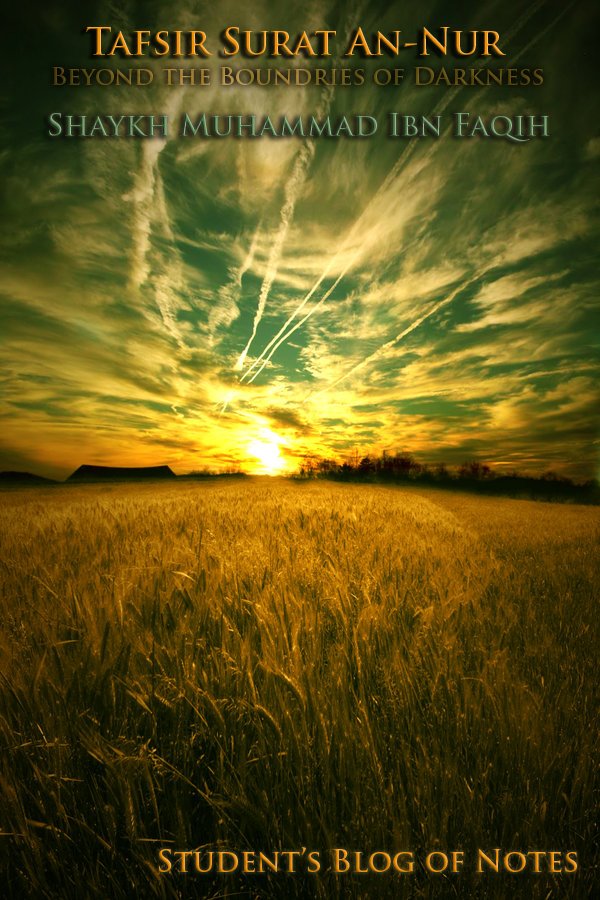Ayah 22-29
Scholars say that these ayahs were revealed connected to the story of Aisha (ra).
(22) And let not those among you who are blessed with graces and wealth swear not to give to their kinsmen, the poor, and those who left their homes for Allah’s cause. Let them pardon and forgive. Do you not love that Allah should forgive you And Allah is Oft-Forgiving, Most Merciful.
• This verse was revealed in response to Abu Bakr (ra). MislaH (participated in slander) was a relative of Abu Bakr that used to be taken care of by Abu Bakr. After the incident of Aisha, Abu Bakr vowed not to support him anymore. This ayah was revealed to:
o ?
o ?
o Encourage Abu Bakr to continue their good deeds.
o Allah (swt) advises Abu Bakr to do pardon and forgive. And He motivates him by saying “Would you want Allah to forgive you?”
• Abu Bakr replied, “Indeed, I would love for our Lord to forgive us.”
• Three words used for forgiveness:
o `afw: to pardon; to relieve the person from the consequences of his/her actions; to erase a trace of something; occurs only if revenge is appropriate
o SafH: to turn away; to remove; to overlook and to get rid of the effect upon self.
o Maghfirah: only Allah (swt) is capable of ghufran; to absolve; to exonerate
The children of Israel ask Allah (swt) for rain and they get no response. Musa will then beg for rain and Allah (swt) said that amongst you is a man that is sinning and if he is amongst you, then we are not going to grant you rain. Musa then makes the announcement to his community and after that, Allah (swt) granted rain upon Musa’s community. Allah said that that person repented. Musa wanted to know who it was and he asked Allah for who it was and Allah (swt) responded and said that this man has sinned in private his entire life and repented in private, so why should I reveal his identity right now?
• When Yusuf (as) was accused of trying to seduce the wife of the governor of Egypt, Allah (swt) exonerated him through a little baby. In the case of Maryam (as), her baby boy exonerated her. In the case of Aisha (ra), 15 verses came down directly from Allah that exonerated her.
Definitions:
Word Explanation
ya'tali - to vow
ulu - people of
al-fadl - grace; excellence; virtue; nobility
masakin - needy
(23) Verily, those who accuse chaste believing women, who never even think of anything touching their chastity and are good believers – are curse in this life and in the Hereafter, and for them will be a great torment. (24) On the day when their tongues, their hands, and their legs will bear witness against them as to what they use to do.
• Allah is creating a special case here in defending women who are accused of being unchaste. He says they will receive a great punishment. He then goes on to discuss this in more detail.
• On that day, their tongues (that were used to accuse others), their hands, and their legs (used to get to those places), all of them will testify against them. The Prophet (saws) said, “On the day of Judgment, the disbeliever will be shown his deeds. He will reject them (that is what disbelief is). It will be said to him, “Here, your neighbors will testify against you. The person will say they are liars. What about your family? They are liars. They didn’t care about me. He will say bring someone who care for me. Allah will then ask his own self (body parts) to testify against him.”
(25) On that day, Allah will pay them the recompense of their deed in full, and they will know that Allah, He is the Manifest Truth.
• The Prophet used to laugh and he was asked why and his response was, “The person will say, ‘I will not accept anyone to testify against me except myself. His mouth will then be sealed and his body parts will testify and speak against him. The kafir will then say to his own body parts, “Damn you! I was trying to protect you from what was going to come next!”
Wednesday, March 11, 2009
Subscribe to:
Comments (Atom)
